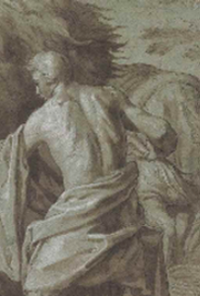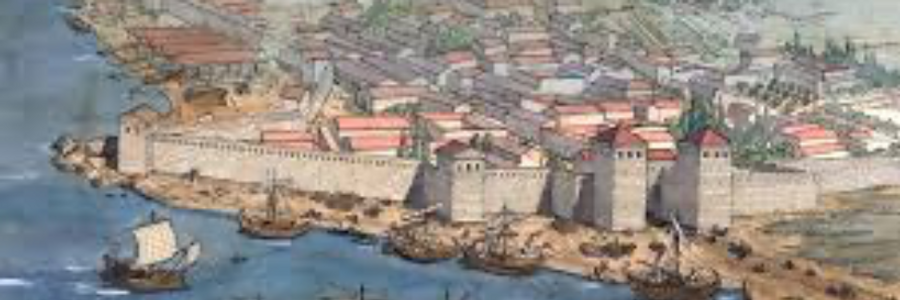The Mogul of Massilia
Standing in a vat of human urine up to his neck all day long, the future mogul of Massilia had plenty of time to think, stomping the filth out of Roman togas day in and day out, dreaming of owning the very shop that had become his prison, imagining a better mosaic pattern on the floors to compliment the green on the walls, watching his owner conduct business, and soaking it all in. One day, as fate would have it, his owner croaked, leaving the business to be divided up equally amongst all the slaves who were working there, including our future mogul, though with no family of his own, having begun his life as an orphan then a slave. He’d often wondered what his owner’s secret had been, but it was no elaborate mystery; his owner had listened carefully to everyone about everything, remembering and writing down names and birthdays and children’s names until he knew his clientele so well they would forgive his frequent price hikes, his breath sour with wine, his occasionally sloppy work. But not our destined dynast; no, for him, the work from his shop would be immaculate. His former fellow slaves hurried to sell their shares, hoping to flee from the bitter, retching, ubiquitous stench. Our to-be tycoon used his money wisely, wining and dining a young, inexperienced, and eager banker to loan him enough money to buy the others out. After much wine and much convincing, he prevailed, persuading the banker, unwittingly making a lifelong friend of Quintus Sabius. With the generous loan, he bought it, lock, stock, and barrel, where he had spent so much time. While he still used slaves, he saw to it that they, under his tenure as top dog, would be treated more humanely than their owner. His fame and reputation grew from there.
Within three years, he was rich. His knack for listening combined with a formidable memory, a gift from his father’s side of the family; from his mother’s side, an artistic eye. His great-great-great grandfather, a famous sculptor, had survived Alexander’s siege of Tyre, where the mighty Macedonian had murdered the citizens of Tyre, who had held off the impatient king for six months. His talented ancestor had only survived because of his skill, which convinced Alexander to spare him. Having passed on the management of his dry cleaning shop to a trusted and intrepid slave there, our burgeoning bigwig had shrewdly watched his pennies, transforming his business from one shop to two, from two to four, and from there purchasing shares in other businesses and ventures, including the profitable beast trade for the ever-hungry arenas and beast hunts, purchasing it from another ersatz ex-slave. His fortune made, he looked to sow the seeds of a dynasty, interviewing a bevy of beautiful, boring, silk-stocking potential brides to no avail, before finally settling on an aristocratic shrew whose ugliness was only surpassed by her extensive dowry, provided by a zealously eager father who fervently wished to be rid of such a cantankerous creature instead of marrying her off to a proper patrician.
He fathered four children on his vituperative vixen: three daughters and one son. The daughters, resembling their mother in both irksome personality and unfortunate looks, soon realized that they were only pawns to be sacrificed on the altar of their father’s Alexander-esque ambitions, causing them to cleave even more closely to their mother. The son, initially a weak and sickly child, received all the love, education, and benefits as befitted the son of an ancient aristocratic line: grooming and education from the finest teachers money could buy, lessons in business and war, and an endless stream of suitors, each one wishing in her heart of hearts to marry the handsome, young, and feeble heir apparent. The mogul, who had adopted his master’s name, as per the Roman custom, of Marcus Cassius, managed to persuade the town council to append an additional name of “Victor” after his donation of a dozen lions to a show in Massilia, giving him a much vaunted and prestigious honor to a man who had spent most of his youth in a barrel of piss.
His good fortune, however, did not hold out forever. After marrying off his eldest daughter to his oldest friend, Quintus Sabius, he traveled the length of the Italian peninsula, traversing the Straits of Messina to Sicily where he met a man of marvelous mettle and all the sophistication of a wild boar. Quickly realizing the salty Sicilian’s potential, he gave his second daughter to Aulus Vettius, whose coarse accent and manners from the back end of beyond resulted in a monumentally unhappy union. Perhaps seduced by the lure of another wealthy and well known son-in-law, Cassius Victor traveled to Rome, seeking a husband for his third and youngest daughter, only to be wooed and won by the silver-tongued Lucius Calvinus, a wiry and wily patrician whose name was only his first claim to fame. Before the engagement had ended, though, tragedy intervened in Victor’s life. His prospective son-in-law Calvinus loaned his beloved son an immense amount of money to pay off gambling debts the younger Marcus Cassius had accumulated out of boredom and bad bets on horses, gladiators, and his own father’s wild beasts. Raised in a bubble of privilege and boundless paternal adoration, he steadfastly refused to repay the mounting mountain of debt, snubbing Calvinus at every opportunity, whispering to friends about Calvinus and his illicit business interests in Italy and elsewhere, and slandering his debtor as a viper in the bosom of his father. Calvinus, enraged to extremes, plotted his resentful retribution, beginning with offering an olive branch to his estranged brother-in-law-to-be in the form of a sea voyage up the Rhone to the picturesque town of Arelate, ending with the ship, specifically constructed to fall apart a short time after the launching, sinking into the sea while the entire hapless family watched in helpless horror. Cassius Victor, no fool as to the incident’s prime mover whose guilt he was ultimately unable to prove, watched his son’s head sink beneath the cold, uncaring waves of the Mediterranean. Calvinus realized the jig was up for him in Massilia and moved to Arelate, followed closely by Vettius and Sabius, sent there by their furious father-in-law to keep an observant eye on the machinating Calvinus. Cassius Victor kept control of his wildly profitable animal trade, relinquishing control of his other enterprises to the husbands of his daughters, divvying them up as Alexander had, on his deathbed, distributed his empire to his generals. The third daughter remained unmarried, claiming sorrow for her lost brother as her excuse for staying unwed.
And so our mogul waited for the day he could have his vengeance against the man who had surely murdered his son, his family name, and his family’s future.

